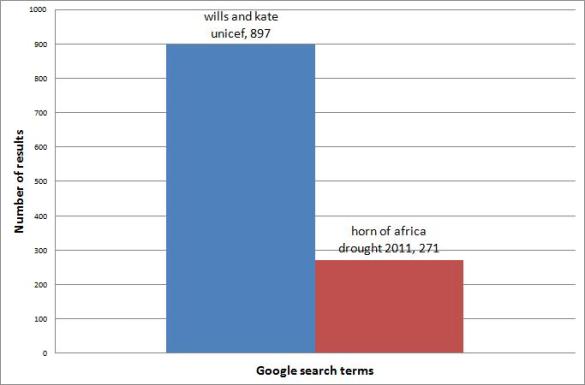This post was originally written for Development In Action.
Prince William and his wife Kate Middleton (you know, Pippa‘s sister) visited a UNICEF centre in Copenhagen last week to ‘draw attention to the Horn of Africa crisis, which Middleton called “shocking.”‘
Well thank goodness for that.
BACKGROUND: The Duke and Duchess of Cornwall are members of the Royal family from the little known island nation of Britain. They are most famous for having had a wedding. Britain, much like Royals, used to be kind of a big deal but has diminished in importance fairly drastically in the last century or so.
Now, as I wrote about a little while ago, the classic argument for getting celebrities on board with humanitarian work/do-goodery is that they generate miles and miles of coverage. Did their visit stimulate a suitable avalanche of articles? A swift Google news search for ‘Wills and Kate unicef’ reveals a fairly staggering 897 articles. To put that into context if you search ‘horn of africa drought 2011’ you get 271 results.

Results taken from links in the above text. I was specifically looking at 'News' results, rather than basic hits.
A slight caveat is that it has been a particularly big year, media wise, for Wills and Kate because of the wedding and all its associated memes – frowning flower girls, scene-stealing posteriors and ridiculous headpieces helping to keep the pair in newspapers and plastered all over the internet for months. Not only have they had a lot of coverage but it has pretty much all been positive. They are very much hot media stuff. Well done, UNICEF, good choice.
The importance of celebrity pulling power in the modern media landscape is incredibly significant. The days of everyone’s news source being The Times are very far away. A fascinating academic paper published in 2008 put it this way:
…as the public is offered greater choice in their media diet, the choices people make most often take the form of entertainment, rather than politically oriented news. Americans are thus increasingly likely to get information about political events incidentally, via soft news outlets like Entertainment Tonight or the Daily Show, rather than to learn of them through traditional news source.
America is used as the case study for this paper but I recognise many of the observations as being equally true in the UK – I’m sure many people around the world will feel the same way. What’s especially interesting (and earns the UNICEF press team an extra pat on the head) is that minor celebrities basically don’t get advocacy/charity coverage: you have to wheel out the big guns or no one is interested. This makes sense: if you look at the celebrity pages of newspapers pretty much all the stories are about the same, say, 20 people. Obviously these people change year on year but the stable of useful celebrity campaigners is always very visible and quite small – choosing correctly and convincing them to get on board is the real trick.
How useful is the increase in coverage?
The media, if it possibly can, infantalises issues. Politics is a childish game of public point scoring between opponents with much more in common than can possibly be healthy. Social issues tend to be boiled down to the simplest possible narrative, economic issues become are a battle of haves and have nots. A major thread of the recent “anti-capitalist protests” (another dumbed down version of the truth) started with Occupy Wall Street has been the fact that it has stumped traditional media appraisals in a frankly hilarious way – as written about rather brilliantly in Slate.
This is where ‘celebrity advocacy’ starts to reveal more drawbacks. Take a look again at those pages and pages of stories on Wills and Kate helping out UNICEF – a significant proportion of the articles are wild speculation about Kate’s possible pregnancy (she DIDN’T EAT SOME NUTS). The reason for the Copenhagen visit and mentions of UNICEF are normally in those stories. The fact that they are buried under celebrity guff suggests that the celebrity impact, the added news coverage and all that parade, might not be helping the cause. If the plight of millions of starving human beings is seen as being less exciting news as a famous person not eating nuts, we have a problem. Not only that, the fact that the UNICEF appeal is disdainfully thrown, in passing, into the story it sends a message to the terrifying hordes of readers that those things don’t really matter – even when people say they matter, it’s certainly less than literally any other news about a famous person.
Simply increasing coverage of events, issues or charities shouldn’t be the measure of how good a charity campaign has been. The usefulness of saying ‘hey, look how many people saw this story/turned up to this event/bought this rubber wrist band – we’re doing advocacy!’ is a very simplistic analysis of a much more complex issue. I don’t blame celebrities here or even, wholly, the media, although they are part of the problem. It isn’t the problem of do-gooders to change the media industry. It is up to global development professionals to ensure that they don’t pursue easy solutions to difficult problems.
People who work in global development generally go into it to help people. Campaigning is meant to educate society about things that make people suffer and ways that we can stop that. Pandering to a system that infantalises debate and reduces news to the simplest possible narratives can never achieve that aim. The use of celebrities can be useful but certainly isn’t always going to be – it is up to those of us who work in global development to make sure that we take the right campaigning option, not the easy one.
